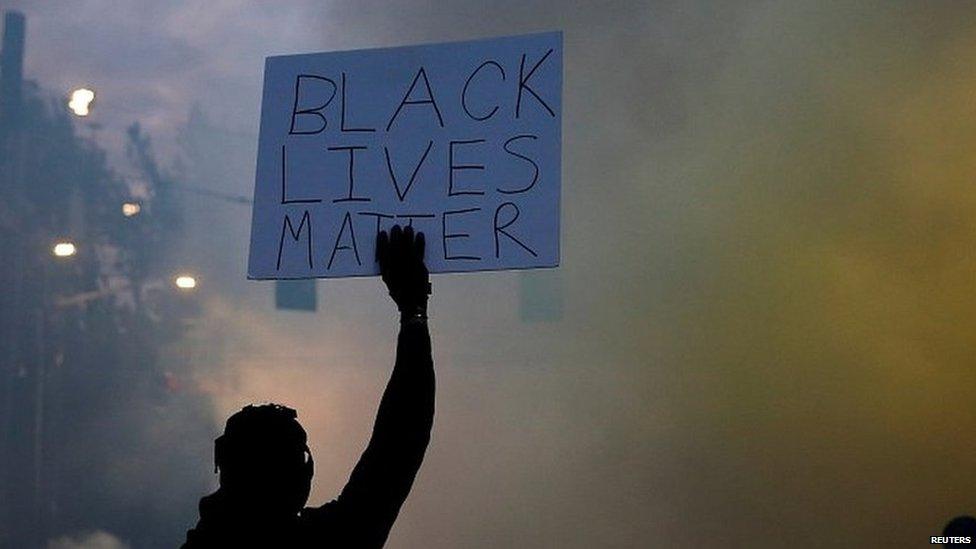George Floyd: Labour urges ban on riot control exports to US
- Published

The UK is being urged to halt all sales of riot control equipment to the United States amid concerns they may be being used by police to suppress protests over the death of George Floyd.
Labour said the UK had licensed exports of tear gas and riot shields in the past year and any use for internal repression would contravene the law.
The SNP has joined calls for existing and new orders to be suspended.
Boris Johnson said controls on UK exports were highly "scrupulous".
The African-American man's death in police custody in Minneapolis on 25 May prompted an international outcry and sparked a wave of peaceful and violent protests across the US.
Dozens of people have been injured as authorities used tear gas and force to disperse protests which have swept more than 75 cities.
President Trump has urged state governors to mobilise their national guard to control the protests and threatened to send in the military to quell the disturbances.
Labour is urging ministers to clarify whether any UK-made equipment is being used by US police in their operations and, if it is, for all future orders to be immediately suspended.
Shadow international trade secretary Emily Thornberry said police forces across the US had used "excessive force" against peaceful protesters, including children, and it was an "obvious matter of concern" that UK-made equipment could potentially be used to "crush" legitimate demonstrations.
'Right to know'
She has urged International Trade Secretary Liz Truss to publish details of all current riot control exports, who has bought them and for what purpose over the past five years.
She said a recent report from the Department for International Trade suggests licences granted include for anti-riot shields, anti-riot guns, portable riot control electric shock devices, tear gas and components for anti-riot guns.
Ms Thornberry said ministers should not "shirk" their duty to uphold basic human rights because of the UK's close relationship with the US, with the two countries historic alliance making it all the more important for the UK to act.
"It has been the policy of successive governments over the past two decades to refuse licences for the export of arms and equipment that might be used for internal repression in the countries to whom they are being sold.
"If there is a risk that any of these riot control projectiles and equipment are being used in the United States against peaceful, unarmed civilians, then the government must act immediately to stop their export.
"The British public deserve to know how arms exported by this country are being used across the world, and the American public deserve the right to protest peacefully without the threat of violent repression."
'Strong signal'
Meanwhile, Labour's Dawn Butler says she expects 90 MPs from across the Commons to sign a separate letter to Ms Truss later this week calling for action.
The Brent Central MP, who was the party's equalities spokeswoman for many years, told the BBC a cross-party approach would send a "strong signal" about the strength of feeling and the need for the UK to be more "disapproving" of the actions of the US authorities.
"Now is the time to make our voices heard," she told the BBC. "This is something that can unite Parliament and is ethically and morally the right thing to do."
"Of course this is one of the times when people are all saying the right thing but we can do something tangible."
The UK government has welcomed the fact a Minneapolis police officer has been charged with Mr Floyd's murder.
But ministers have refrained from directly criticising President Trump's response to the ensuing protests, saying they do not want to get involved in another country's domestic affairs.
Speaking at Prime Minister's Questions on Wednesday, Mr Johnson said he understood the strength of feeling over Mr Floyd's "appalling" death but that demonstrators should always remain within the law.
In response to a question from the SNP's Ian Blackford, he said "all exports are conducted in accordance with a consolidated guidance and the UK is possibly the most scrupulous country in that respect in the world".